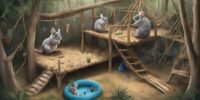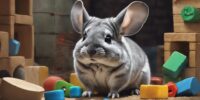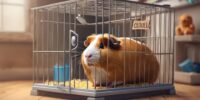Why Certain Fruits and Vegetables Are Dangerous for Chinchillas

Certain fruits and vegetables are dangerous for chinchillas due to their high sugar and water content, which can disrupt their sensitive digestive systems. These foods can lead to issues like diarrhea, bloating, and obesity in chinchillas.
It's important to be aware of the risks and stick to safe treats for your furry friend's well-being.
Oxalates and Chinchilla Health
Oxalates can pose a serious threat to your chinchilla's health if consumed in excess. Preventing oxalate toxicity is essential for maintaining your furry friend's well-being. Nutritional oxalate management is vital to ensuring a balanced diet for your chinchilla. To shield your pet from the dangers of oxalates, you must be diligent in monitoring their intake of foods high in this compound.
To prevent oxalate toxicity, limit the consumption of high-oxalate foods such as spinach, beet greens, and parsley. Instead, focus on offering chinchilla-safe options like hay, pellets, and limited amounts of safe fruits and vegetables. By practicing nutritional oxalate management, you can safeguard your chinchilla against potential health issues associated with oxalates.
High Sugar Content Dangers
Limit the intake of sugary fruits and vegetables to protect your chinchilla's health and well-being. While these treats might seem harmless, they can pose serious risks to your furry friend. Here's why you should be cautious:
- Sugar overload risks, digestive issues: Chinchillas have sensitive digestive systems that struggle to process high amounts of sugar. Excessive sugar intake can lead to digestive problems like bloating, diarrhea, and even gastrointestinal stasis, a life-threatening condition where the gut stops moving.
- Hyperglycemia dangers, insulin imbalance: Chinchillas are prone to hyperglycemia, a condition characterized by high blood sugar levels. Foods with high sugar content can spike their blood sugar, leading to insulin imbalances and potentially causing long-term health issues like diabetes.
- Weight management challenges: Sugary fruits and vegetables can contribute to weight gain in chinchillas. Excess weight puts strain on their joints and can increase the risk of various health problems. Maintaining a balanced diet is crucial to keep your chinchilla healthy and happy.
Choking Hazards to Chinchillas

Watch out for small seeds and pits in fruits and vegetables as potential choking hazards for your chinchilla. While these foods may seem harmless, they can pose a serious risk to your furry friend's health. Preventing choking incidents is essential when it comes to caring for your chinchilla. Always remove any seeds or pits before offering fruits and vegetables to guarantee their safety.
Maintaining a nutritional balance is key to providing your chinchilla with a healthy diet while minimizing choking hazards. Opt for soft fruits and vegetables that are easy for your chinchilla to chew and swallow. Carrots, bell peppers, and leafy greens are excellent choices that aren't only safe but also nutritious for your pet.
Upsetting Chinchilla Gut Flora
To maintain your chinchilla's digestive health, be mindful of foods that can disrupt their gut flora balance. Chinchillas have sensitive digestive systems, and upsetting their gut microbiota can lead to digestive issues and imbalance.
- Dietary Changes: Abruptly introducing new fruits or vegetables into your chinchilla's diet can disrupt their gut microbiota. It's crucial to make dietary changes gradually to allow their digestive system to adjust without causing imbalance.
- High Sugar Content Foods: Foods high in sugar can alter the balance of gut flora in chinchillas. Sugary fruits like grapes or vegetables such as carrots should be given sparingly to prevent upsetting their delicate digestive ecosystem.
- Probiotic Supplements: In some cases, providing your chinchilla with probiotic supplements can help restore balance to their gut microbiota. Consult with a veterinarian to determine if probiotics could benefit your chinchilla's digestive health.
Toxicity Risks in Chinchillas

Being mindful of potential toxic risks is important for maintaining your chinchilla's well-being and health. Certain foods can pose significant dangers to your chinchilla's health due to their toxicity risks. Consuming foods that are toxic to chinchillas can lead to severe digestive upset and other health issues. It's vital to be aware of what foods are safe for your chinchilla to consume to prevent any potential harm.
Toxicity risks can vary depending on the type of food and the chinchilla's individual sensitivity. Foods like avocado, onion, garlic, and certain pits and seeds can be harmful to chinchillas if ingested. These items can cause digestive upset and other serious health issues that may jeopardize your chinchilla's well-being. Always research and double-check the safety of any new foods before offering them to your chinchilla to avoid any potential risks.
Allergies and Chinchilla Reactions
If your chinchilla shows signs of allergies, it's important to know the symptoms to watch for.
Identifying food allergies can help you prevent further reactions and keep your pet healthy.
Understanding how to manage chinchilla reactions can make a significant difference in their well-being.
Allergy Symptoms in Chinchillas
Allergies in chinchillas can manifest through various symptoms that may indicate a negative reaction to certain substances. Here are three key aspects to ponder when it comes to allergy symptoms in chinchillas:
- Symptom Recognition: Keep an eye out for signs such as itching, sneezing, or skin irritations, as these could be indicative of allergic reactions in your chinchilla.
- Prompt Treatment: If you suspect your chinchilla is experiencing allergies, consult a veterinarian promptly for appropriate treatment options to mitigate discomfort and prevent further complications.
- Dietary Adjustments: Symptom management often involves dietary adjustments to eliminate potential allergens and make sure your chinchilla's diet is free from substances causing adverse reactions.
Identifying Food Allergies
Identifying food allergies in chinchillas requires keen observation of their reactions to different foods and vigilance in noting any adverse symptoms they may exhibit. Cross contamination risks should be minimized by ensuring chinchilla food is stored separately from potential allergens. Allergen testing can help pinpoint specific triggers if allergies are suspected.
Consider implementing food rotation to diversify their diet and reduce the risk of developing new allergies. Elimination diets may also be beneficial in identifying problematic foods by removing items one by one and observing for any improvements in their health.
Managing Chinchilla Reactions
To effectively manage chinchilla reactions, it's important to monitor their dietary intake closely and promptly address any signs of discomfort or adverse effects they may exhibit.
Here are three key tips to help you navigate managing reactions and dietary restrictions:
- Observation is Key: Pay close attention to your chinchilla after introducing a new food item. Look out for any changes in behavior, stool consistency, or signs of distress.
- Consult a Veterinarian: If you notice any adverse reactions or are unsure about certain foods, seek guidance from a veterinarian specializing in exotic pets to ascertain the best care for your chinchilla.
- Gradual Introductions: When adding new fruits or vegetables to their diet, introduce them gradually in small amounts to monitor their response and prevent sudden adverse reactions.
Impact on Chinchilla Dental Health
When it comes to your chinchilla's dental health, it's important to be aware of the risks of dental wear and teeth overgrowth that certain fruits and vegetables can pose.
These dangers can lead to serious consequences for your chinchilla's overall well-being.
Understanding how specific foods impact dental health is essential for maintaining your furry friend's oral hygiene.
Dental Wear Risks
Constant chewing on hard fruits and vegetables can lead to dental wear, posing a significant risk to your chinchilla's dental health. To guarantee your furry friend's teeth stay healthy, consider the following:
- Provide Chew Toys: Offering safe chew toys specifically designed for chinchillas can help satisfy their natural chewing instincts without risking dental damage.
- Regular Veterinary Check-ups: Schedule regular check-ups with a vet experienced in chinchilla dental care. They can assess your pet's teeth and provide guidance on preventative measures.
- Monitor Chewing Habits: Keep an eye on your chinchilla's chewing habits. If you notice excessive wear or changes in their eating behavior, consult a vet promptly to address any dental concerns.
Teeth Overgrowth Consequences
Chinchilla dental health can be significantly impacted by teeth overgrowth, potentially leading to various consequences if not properly addressed. Dental care and prevention are essential to avoid health risks associated with tooth trimming. Regular check-ups are vital to catch any signs of overgrowth early on. Here is a table to help you understand the consequences of teeth overgrowth:
| Consequence | Description |
|---|---|
| Malocclusion | Misalignment of teeth due to overgrowth, leading to difficulty in eating. |
| Painful Ulcers | Overgrown teeth can cause painful ulcers in the mouth, affecting eating. |
| Abscesses | Infections may occur due to overgrown teeth, leading to abscess formation. |
| Weight Loss | Difficulty eating can result in weight loss and impact overall health. |
Regular dental care and prompt tooth trimming can help prevent these consequences and ensure your chinchilla's best health.
Frequently Asked Questions
Can Chinchillas Eat Any Type of Fruit or Vegetable in Moderation?
Incorporate a variety of fruits and vegetables into your chinchilla diet, but in moderation. Understand the limitations to keep your pet healthy. Offering a balanced diet guarantees they receive necessary nutrients, promoting their well-being.
Are There Specific Fruits or Vegetables That Chinchillas Should Never Consume Under Any Circumstances?
You must remember, some fruits and veggies are like kryptonite to chinchillas. Toxic fruits and harmful vegetables can wreak havoc on their delicate systems. Stay vigilant and keep forbidden foods far from your chinchilla's diet.
How Can I Tell if My Chinchilla Is Having a Negative Reaction to a Certain Fruit or Vegetable?
If your chinchilla shows symptoms like diarrhea, lethargy, or GI upset after eating certain fruits or veggies, it might be having a negative reaction. Remove the food, consult a vet for treatment, and prevent future issues by avoiding common allergies.
Are There Any Safe Alternatives to Common Fruits and Vegetables That Chinchillas Can Enjoy?
For safe chinchilla snacks, consider nutritious alternatives like hay cubes, rose hips, or plain oats. These options are healthy and tasty for your pet, ensuring a balanced diet without the risks of certain fruits and vegetables.
How Often Should Fruits and Vegetables Be Included in a Chinchilla's Diet for Optimal Health?
In the delicate dance of chinchilla care, the key lies in balance. Include fruits and veggies in your furry friend's diet 2-3 times per week for peak health benefits. Too little or too much can lead to drawbacks.











